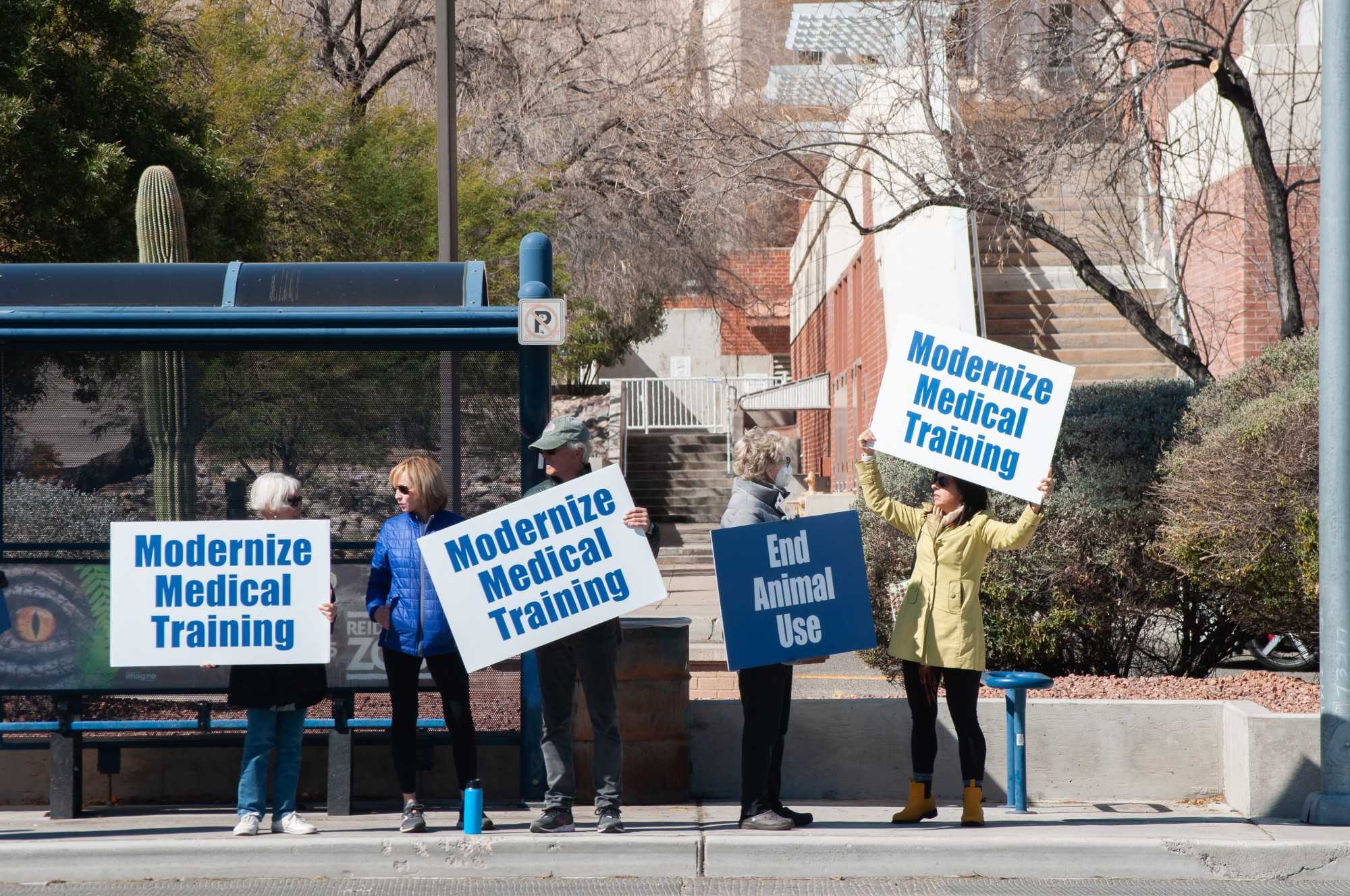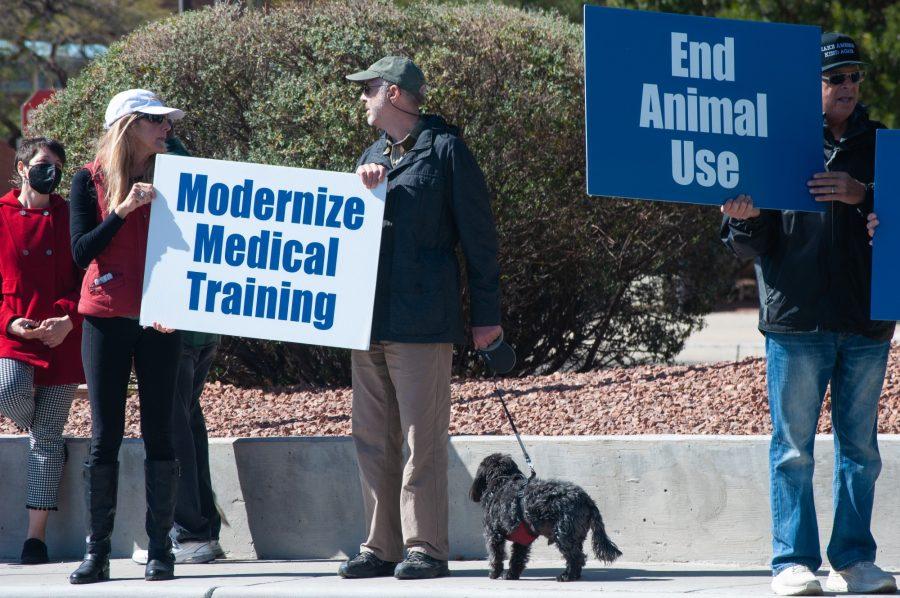A protest against the use of live pigs in medical training was held in front of the University of Arizona’s College of Medicine on Thursday, Feb. 24. People gathered at 11 a.m. and dispersed around noon.
The protest was organized by the Physicians Committee for Responsible Medicine and supported by members of SPEAK, both of which participate in animal advocacy. Individuals protested the UA’s use of live pigs to practice invasive medical procedures in surgical training.
Over forty people stood on the sidewalk of North Campbell Avenue holding signs that read “End Animal Use” and “UA: Stop Using Animals to Teach Human Medicine.” The PCRM also purchased five billboards within a 1.5-mile radius of the UA campus.

Dr. Kerry Foley was present as a representative of the PCRM. Foley was an emergency physician for 25 years in the Washington, D.C., area, as well as an assistant professor of emergency medicine at the Georgetown University School of Medicine.
Foley called the use of live pigs antiquated, citing a general trend away from the use of live tissue and towards human simulation in surgical training.
“What we used to do back in the Dark Ages was to use live animals to teach surgical procedures to our trainees,” Foley said. “Over time, we’ve developed these really incredible human-relevant, human-anatomically-identical simulators and virtual reality headsets that are insane. … It’s really become the educational gold standard, I believe, in training.”
In January 2021, the PCRM filed a federal complaint to Robert Gibbens, director of Animal Welfare Operations for the U.S. Department of Agriculture, requesting an investigation into the UA’s use of live animals for training. The complaint alleged that the UA’s Institutional Animal Care and Use Committee was “responsible for the improper approval and ongoing use of live animals in its general surgery residency program.”
RELATED: Women in STEM
Specifically, the IACUC should not have approved the use of live pigs because “alternatives exist” and the use of live animal tissue is “not ‘unavoidable,’” which fail to fulfill the two requirements that must be met in order for animal use to be justified.
The PCRM has not received an update from the USDA’s Animal and Plant Health Inspection Service since it filed the complaint according to Reina Pohl, communications specialist for the organization.
The crowd of 40 that assembled in front of the College of Medicine was a mix of Tucson locals, students and long-time animal-rights advocates.
“We’re protesting the use of animals, specifically pigs, in the training of medical doctors here,” said Jeanne Holt, a Tucson resident and mother of two UA alumni. This is her first time protesting and heard about the event on Facebook.
“There are more modern, artificial ways of doing the same training,” Holt said.
Foley expanded on this point, saying that modern methods are not only more humane, but they’re also more efficient.
“When you’re training somebody to do surgical procedures or any kind of procedures, if you use a simulator, you can do it eight or 10 or 12 times until you master the skill,” Foley said, “whereas, in a live animal lab, you get one shot, and so it just is much more efficient.”
In a news release, the PCRM argued that the UA’s Simulation Technology & Education Center rendered the use of live animals unnecessary. According to the ASTEC website’s “About” page, the simulation center is a 30,000 foot facility that includes “six patient rooms, three of which can be converted to any type of hospital environment and three that represent an operating room, intensive care unit, and labor and delivery suite, each equipped with hospital-grade gases.”
The PCRM claimed in the January 2021 complaint that the Arizona Center for Endoscopic Surgery Residency Training Program was approved to use up to 183 pigs over three years, according to documents obtained under the Arizona Public Records Law.
“It’s barbaric,” said Elaine Waddle, a transfer student at the UA and member of the VeggieCats club. “In my opinion, it’s something that needs to really be reevaluated. Hopefully, this protest helps to kind of at least bring it to more of the public consciousness. I’d like to believe that they will, but I don’t know for sure if they will.”
Gary Vella is the Tucson chapter coordinator of SPEAK, which stands for “Supporting and Promoting Ethics for the Animal Kingdom.” When Vella heard that the PCRM was going to protest at the UA, he called on other SPEAK members to join them via the group’s Facebook page.
“Personally, I’ve always thought that using live animals for research, especially invasive research, always to me seemed to be some of the most insidious of all the animal abuses that we deal with,” Vella said.
Vella told the Daily Wildcat that he has engaged in animal rights advocacy for nearly three decades. SPEAK also plans to protest at the Tucson rodeo, or “La Fiesta de los Vaqueros.”
“I lose my faith in humanity when I see garbage like that, and I don’t care if they say that they can save somebody in my family or the kid down the block,” Vella said. “That’s not the animal’s problem. You know, that animal has a right to its life just as much as you do, I do or anyone else.”
Follow Kristijan Barnjak on Twitter









